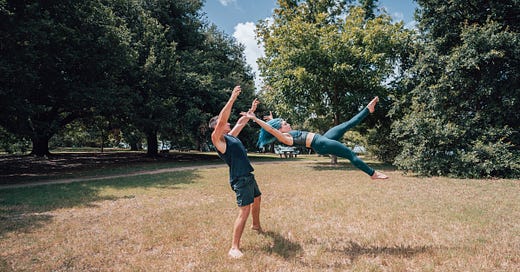I’m sometimes disappointed when I hear the crowd roar.
It’s not that I don’t appreciate applause — performing partner acrobatics on stage to deafening silence would be strange. But I prefer applause for skills I’ve sweated for, and those rarely get the house on its feet.
It’s a problem devotees of many arts have observed for millennia:
“They say that the trainer Hippomachus, when an athlete he was training competed in wrestling and everyone who was present applauded, struck the student with his staff. “You did it badly, and not as you should have,” he said. “You should have done better. If you had done it artfully they would not have applauded you.” — Aelian, Historical Miscellany, 2.6, 2nd Century A.D.
There is and has always been a gulf between what’s best and what appears to be best to the uninitiated in nearly every art and sphere of life. To maximize adoration, the skilled person replaces their best with a dumbed-down, flashier “hot take” version that requires less skill and discernment to appreciate.
This parody knock-off of the True, the Good, and the Beautiful, warped for mass consumption, engulfs much of our world. When you start looking, you see it everywhere.
Look Maxing Gone Wrong:
There’s a funny delusion at the heart of male and female “look maxing,” at least as far as its purpose is attracting mates.
Most women won’t find men with spaghetti arms and stick legs attractive, preferring some substance and strength. But there’s a limitation on that preference, and most find huge bodybuilders freakish. The biggest ones receive admiration from their fellows, but have more trouble finding dates than the merely fit.
Similarly, men appreciate women with healthy bodies and find modest amounts of makeup attractive. But by the time women are caked in gook, their lips blown up with injections, and their smiles disabled with botox, the uncanny valley effect strikes. Their pursuit of beauty has rendered them freakish and undesirable to all but a few devotees.
When we follow the acclaim incentives of niche audiences or those with other values, we often end up in strange places, fighting for the regard of people we don’t even respect.
The Dance Contest That Wasn’t
“How foolish one must be to leave a lecture hall gratified by the applause of the ignorant! Why do you take pleasure in praise from those you cannot praise yourself ?
— Seneca, Letters, 52.11
When my girlfriend asked me to watch Dancing with the Stars with her I was surprised that it didn’t suck. I don’t watch much TV, and assumed the dancers and choreographers would be crap, but many were very talented.
But after a few episodes I realized what the announcers wouldn’t say — it’s not a dance contest.
At each episode’s end, some of the worst dancers remained while their betters went home. The judges gave fairly reasonable analysis and scoring, so why was the home audience so bad at recognizing skill and talent?
And then we saw the dancers backstage, begging “the other crowd,” and it became clear. The worst dancers often had prebaked fan bases from unrelated ventures. They begged social media followers to call in and vote, though those people weren’t watching the contest and had no idea who they were voting against.
I don’t know who won. I didn’t watch that far. But I wonder if the victors minded — or internally acknowledged at all — that part of their margin was generated not by excellence but by algorithms.
And of course, none of this matters. When you seek the stage and the roar of the crowd, these are the tradeoffs you make. Acro is just a fun hobby for me, and performing an enjoyable side gig. Who cares?
I’ve long since stopped trying to perform the hardest skills in my repertoire. For who would know but us? Certainly not the crowd. My stubbornness would actually reduce their pleasure, and frankly, their pleasure is the game we’re in. The more skillfully we execute, the less they’re able to appreciate. Instead, my wisest performance partners suggest we pepper anything remotely skillful with “cuteness.”
Costumes, flourishes, playacting, and skills I mastered years ago are all we need.
This is the nature of making the sausage in so many spheres. This is what the world’s incentives produce. Excellence isn’t wanted and might well generate disdain. If we stubbornly seek it, we must do it ourselves, for ourselves, without a thought to applause.
A Performative World:
“Even a wise man, if he should be forced to spend time constantly in the company of the depraved, will not escape untainted. Anyone who frequents the perfume shop will carry away some of its fragrance.” — Seneca, Letters, 7.7
Ostensibly a dance contest, actually a social media leveraging contest
Ostensibly mate attraction, actually the uncanny valley.
Ostensibly the best book, actually the most comfortably formulaic.
Ostensibly kindness, actually performative politeness.
Ostensibly virtue, actually virtue signaling
How many pursuits have little to do with what they’re ostensibly all about?
Think of the poor politicians. They’ve always walked a fine line, having to do two jobs.
There’s the song and dance routine that gets them elected, and then the job of governing unruly nations. Mastery of wonkish policy minutiae and getting the crowd to roar rarely go hand in hand, so they’re usually deficient at one or the other. Great leaders can’t get elected to high office, or won’t debase themselves pandering to the mob, and so never get in the race.
But the political story of the last decade is the complete eclipse of governing by performative politics. Politicians no longer transition to governing after elections — it’s all song and dance, all the time. Just as the best dancers don’t rise to the top, elections don’t result in the best leaders, because that’s not what’s being incentivized. It’s best that they keep dancing like monkey for a giggling crowd — governing and solving problems would actually hurt them.
Our politicians have no skin in the game, and every incentive to pander to the mob, so we should be more surprised that a few hew to a higher standard.
This is what it comes down to — we’re all buffeted by forces and opinions that pull us from what’s right. It’s only a question of if virtuous otium will call louder than golden negotium.
If you want to chase excellence rather than what the mob applauds, I’ve found a few things that keep us on the straight and narrow.
A small group of wise friends who can provide the right sort of acclaim.
Mental mentors, plucked from the past.
Few of us are perfect, but we can decide to spend a few more minutes each day on the only game worth playing:
Thanks for reading Socratic State of Mind.
If you liked this article, please like and share it, which helps more readers find my work.






I value authenticity and truth, and that is a very difficult value to have in a world of facades and distorted perceptions. But its possible to tell the truth with tact and not use it as a weapon. But no matter how much I value truth, Im still an actor out amongst the world. Theres no other choice. People who punish the truth are asking to be lied to. Most people loooooove being lied to, and we are all very skilled at creating bullshit narratives and lying to ourselves.
Well, if it wasn't working for politicians to do what they do, they wouldn't be doing it. I come from a country where we have a saying, "Don't blame the cake eater. Ask who gave them the cake." What if we, the voters, take our eyes off the circus and take our civic duty more responsibly? But then again, what if these politicians are mouthpieces for our worst instincts? If we take our civic responsibilities more seriously, would we lose the self-gratification we derive from allowing the circus to continue? Just thinking out loud.